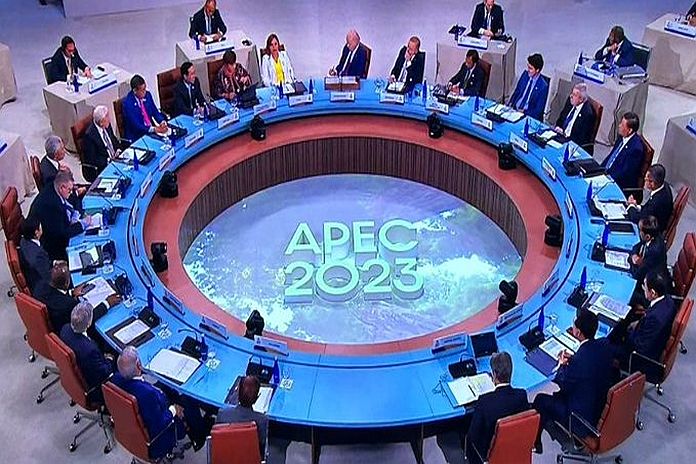– IMF Managing Director Kristalina Georgieva at APEC leaders’ meeting in San Francisco, California, United States, November 17, 2023
By IMF Managing Director, Kristalina Georgieva
First, the good news. The global economy has been surprisingly resilient in 2023. But the recovery from the two consecutive shocks – the pandemic and the war – remains slow and uneven, and divergence in economic fortunes across the world continues to grow.
We project global growth at 3 percent for both 2023 and 2024, and unfortunately, the medium-term growth prospects also remain somewhat weak. This is a concern we have to address, and I will come to that point. Global growth is slightly better than the projections we had when we met last year, but we are below the 3.8 percent annual growth trajectory of the previous three decades.
APEC is a major contributor to the world economy. As we all know, more than half of global growth this and next year will come from the countries around this table. What I want to impress upon us is that this is still an incomplete recovery. The US is the only major economy that has fully recovered to its pre-COVID trajectory. Emerging market and developing economies, by contrast, fall somewhere between four and eight percent below their pre-pandemic growth.
But there is some good news on the inflation front. Inflation is decelerating. We expect headline inflation to fall from more than 9 percent last year to 4.8 percent in 2024. Core inflation is still dragging behind, and the conclusion is that unfortunately, we have to brace for interest rates remaining higher for longer. Likely through 2024 and maybe up to 2025.
So, what does that translate into in terms of policies? Where inflation is still behind target, central banks need to continue to be vigilant and communicate based on data their intentions for the future.
It is very important to recognize that it is going to be a tough time for finance authorities practically, almost everywhere. They need to rebuild buffers for future shocks while at the same time paying for higher interest rates when servicing debt, supporting vulnerable populations, and funding the green and digital transformations.
So, we are in a moment in history of resilience, but also risks. And the last month has illustrated both points.
On the point of resilience, growth in the US exceeded expectations in the third quarter and while momentum may be slowing a bit, inflation is still falling and labor markets are still very strong. Last week we upgraded our projections for China. This adds to positive growth momentum in Asia, especially in ASEAN. And what is good for these two big engines of the world economy, for the US and [for] China, is good for the rest of the world.
But we also witnessed the eruption of the Israel-Gaza conflict and the tragic loss of civilian life in Israel and now in Gaza. Economically, this is devastating for the countries at the epicenter of this conflict. It is also very risky for their immediate neighbours – Lebanon, Jordan, Egypt. In terms of impact for the world economy, the initial spike in energy prices has now receded. And yet we know that the longer the conflict goes, the higher is the risk of an accident, and of course the negative impacts on geopolitical fragmentation.
So let me draw three lessons from the last years
First, we live in a more shock-prone world. Climate change is adding more uncertainty for the future. This means we need even more sound macroeconomic fundamentals, with very little room there for policy errors. And as we heard from president Biden, we need development that is inclusive, where everybody, men and women, can contribute and everybody can benefit.
Second, our projections for slow growth are mostly due to persistent low productivity. To change this, we need structural reforms to enhance labor productivity and safely tap into the benefits and also manage the risks, of new technologies, especially artificial intelligence. According to studies using company-specific data, artificial intelligence can raise annual labor productivity growth by 2 to 3 percent. This is significant, but at the same time, it would create transformation in the labor market. People would lose their jobs and if not paid attention to, can add to social unrest.
As president Biden said, we need well-governed AI to succeed rather than add to risks. And that leads me to my third point – the need for international cooperation. It is paramount, in a world of technological transformation, to collaborate. It is paramount to work together to combat climate change. It is paramount to protect financial stability in our interconnected world, and to address debt issues, especially for low-income countries.
And I want to tell you something that the whole world is thinking today – how good it was for president Biden and for president Xi Jinping to have a constructive engagement. It sends a massively important signal that cooperation can bring benefits to everyone. So, on behalf of the world, the world economy, thank you.
I want to finish also with the role of our institutions, international organizations like the International Monetary Fund. In a more shock-prone world, we also need to be strong. We distributed $1 trillion in liquidity and reserves since COVID, and we can face the future with confidence because, with your support, we now have a 50 percent increase in our permanent quota resources. When the next shock hits, we are ready.
So, cooperation is what you do around this table, and cooperation is what our 190 members count on.





